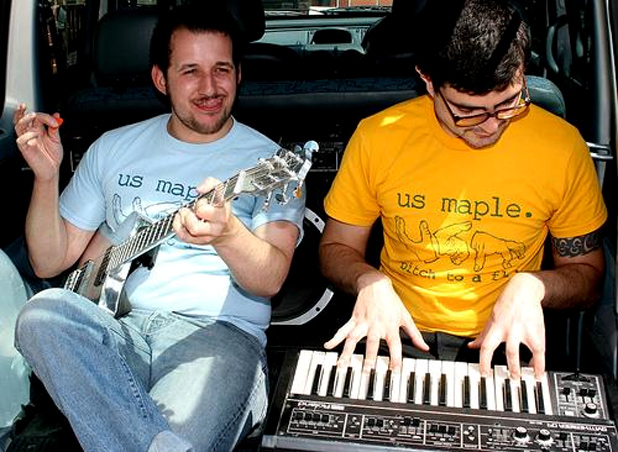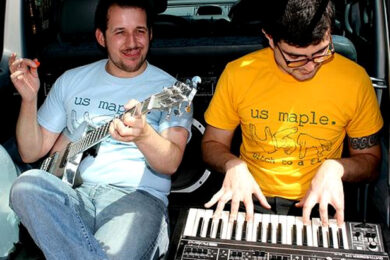DIY has been instrumental to instrumental outfit That Fucking Tank ever since the pair started putting on gigs and putting out records on their Obscene Baby Auction label from their base in Leeds in the early 2000s. Whatever DIY means, that is. The blurred lines between a DIY attitude and bloody minded entrepreneurial ambition are something that gets pondered a lot while talking to Andy Abbot, Tank’s baritone guitarist (drummer James Islip is only available to chat briefly as he’s setting up their gear onstage at Leeds’ Brudenell Social Club, before Marnie Stern, while Andy “plays rock star”).
They both stick to the belief that they “don’t need to become part of a mechanism to achieve what we want to achieve – playing music regularly, releasing records, travelling around Europe and becoming part of a community.” And they’ve done all four, going from playing grunge covers as pre-teens to playing grunge originals and Springsteen covers as adults. On the way they’ve released two albums, 2006’s Day Of Death By Bono Adrenalin Shock and this year’s Tankology, a bunch of sold out 7”s, and dropped their old “math-rock barrier” to let in the influence of Soundgarden, Foo Fighters and Springsteen – fairly explicitly on songs such as ‘Dave Grolsch’ and ‘Bruce Springstonehenge’. [Not to mention the influence of Rapeman, NOMEANSNO and Jesus Lizard, Ed]
They like a pun too, and their first gig as Tank was as support act for a duo called Vialka because, “we thought it would be funny to have a night of only two-piece bands. Nowadays there’d be very little funny or unusual about that,” says Andy.
Do you think there two-piece rock bands are treated as a bit of a genre at the moment?
James: “We do get asked to do a ‘kind of gig’ nowadays. I guess 10 years ago, when I moved to Leeds, line-ups were more varied. It’s definitely more of a fashion thing now, and some promoters that put us on try and impress us by playing some really annoying, obscure noise music before we play that no one wants to listen to. Put on some Michael Jackson or something.”
Andy: “Over time a set of preconceptions about what a duo operating in the underground is going to sound like has developed. It becomes so specialised and fetishes certain bands and types of music that it becomes impenetrable, which hopefully we’ve got beyond in some way.”
Instrumental rock music does have a reputation for taking itself too seriously, but your songs and song titles have fun and humour in them, is that important to you?
AA: “It’s important to laugh at yourself now and again; there are quite serious implications for that. We treat music as a thing in itself, not as a means to an end and because we aren’t doing it to get somewhere then you can dispense with all the self-inflating bullshit. Most bands that attempt that over-earnest, we-will-melt-your-face-off self-presentation end up contributing to the homogenous mass of indistinguishable angular-rock turd.”
JI: “I think it’s funny when people tell me something’s the best thing ever, you’ve got to hear this. I don’t really like the idea of music having a ‘best thing’; trying to be ‘the best noise band’. It’s not like the Olympics where you can set the best time.”
AA: “Humour can also be seen as a defense-mechanism. I hope we aren’t seen as a wacky band because we like puns.”
Talking of which, are there any puns/song titles that didn’t make it on to the album that you wish had?
AA: “If we’d foreseen that people were going to pick up on the titles so much then I guess we could have tried a little harder with the titles of tracks like ‘Mr Blood’ – we think it sounds like the Bloodhound Gang but couldn’t think of a good pun.”
On your blog Andy writes about how DIY/underground music is covered in the press, is there anything you’d like to expand on from that?
AA: “We are very conscious of how our band and the way we do it is presented and what that means within the wider sphere of the radical potential of music. In Leeds in particular, we learnt that the way we’d been doing music as teenagers was as valid, if not more so, than the more conventional signifiers of musical success or progress, like getting a manager or getting signed. You can create your own ways of doing things, and that can be applied to numerous activities outside of music.
“My worry is that as DIY has become a more commonly used tag associated with noisy rock bands from the underground it simply becomes an aesthetic or style. When that happens it loses its radical potential. You end up in a situation where DIY loses any meaning because it is equally applied to a set of bands that might sound or look similar, regardless of their motivations or the way that they do things. The more complicated side is the thin line between DIY self-sufficiency and creativity and neo-liberal entrepreneurialism.
“There’s the famous essay by Steve Albini ‘The Problem With Music’ about why indie bands shouldn’t sign to major labels that was hugely influential; saying why you should be DIY because it makes practical sense. But someone like Tony Blair would probably say the same thing – don’t wait for anyone to come and help you out; do it yourself, you’ll make more money and survive longer.”
An American Dream type of thing?
AA: “Yeah, and it’s quite difficult to separate those two things out. The reason we started doing to the band they way we do it wasn’t from any philosophical or political background – it wasn’t, ‘We’re interested in anti-capitalism, let’s start a band!’ I don’t think there is a lot of difference in the first instance between a lot of independently minded bands and someone living the American Dream.”
Just sticking to something like Albini’s essay as set of rules sits uncomfortably with ‘the independent spirit’ as well, I suppose.
AA: “It can get to the point when it becomes this ‘moral code’ that you adopt 100 per cent or don’t. There was definitely a time, like with the straightedge hardcore scene, where it was quite militant in a way. One of the healthy things that’s happened in the last few years is people don’t have to look or act a certain way to be legit. You can adapt it into a way of doing things that suits you. Being creative with DIY makes is potentially more sustainable.”
TFT rehearsing
You mentioned how perhaps line-ups at gigs in Leeds have changed, how much do you still feel a part of what’s happening there?
AA: “Yeah, we’ve got a lot to be thankful of in Leeds. Ten years ago it was an incredibly supportive and vibrant scene for bands wanting to do things in an alternative way and nowadays it is even bigger. Whether the increase in the audience for DIY music is a positive thing is something that can be debated. I still feel an affinity with that activity but constantly need reassurance about the motivations and thinking behind it.”
Do either of you still have jobs outside the band?
AA: “I think it’s integral to the band that we have a lot of activity outside of Tank, whether that be paid work or other bands. When we play a gig down south, get back to Leeds at 4am and have to get up early the next day to give a presentation or do some tutoring [Andy is an artist/lecturer] I sometimes wish we could concentrate on just the one thing, but we like to keep things mixed up and itinerant. That way you really appreciate each element, despite the occasional bags under the eyes.”



